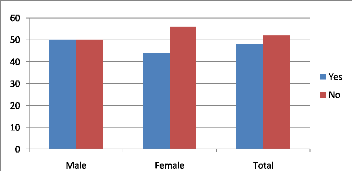4.1.2.4 Perceptions of the impact of foreign aid on the
Rwandan economy
Figure 4.2:


It was established that (90%) of the respondents indicated
that Foreign Aid contributed significantly to the socio-economic development of
Rwanda indicated so. Foreign Aid helps in the development of the proposed
projects and their implementation.
Some of their typical responses were:


It does, because Rwanda engages itself on partnership
platform not patronage. Many economic growth sectors have been remarkably
developed like infrastructures.
) RUiJQIISiGILelYEiQ 5 ZEQGa1r6RFiR-economic
development because they bring projects, create job for us and develop Rwandan
with those projects
Although the macro-economic strategy of Rwanda aims in the
long run to decrease excessive dependence on foreign aid, at present all
indications point in one direction: that she cannot do without assistance.
Findings reveal that there is a program in place called VUP - Vision 2020
Umurenge programme. It is the second flagship of EDPRS, it accelerates the rate
of poverty reduction by promoting pro-poor components of the national growth
agenda. This will be achieved by releasing the productive capacity of the poor
in rural areas through a combination of public works, promotion of
cooperatives, credit packages and direct support. In the end, these people
graduate and move from one category of poverty to another, that is most poor to
poor and then to rich-to-be. The idea is eventually eradicate poverty among the
people. EDPRS, (2006)
This is part of the Paris Declaration on Aid Effectiveness to
which the GoR and its development partners are signatories (Rwanda Aid Policy:
2006: 6). The overall objectives identified by the parties to the Declaration
include aligning donor programs to government, strengthening country reporting
systems and strengthening local capacities (ibid). But the question that
remains is: is poverty itself viewed as entirely negative?
4.1.2.5 Views on whether Foreign Aid creates Dependency
on Rwanda by Organization
Table 4.3:
|
Organization
|
Frequency (%)
|
|
Yes
|
No
|
|
Government
|
8
|
10
|
|
NGO
|
0
|
0
|
|
NA
|
6
|
8
|
|
Total
|
14(43.75%)
|
18(56.15)
|
It emerged from the study that (44%) of the respondents have
negative perceptions about foreign aid. According to some of them it creates
dependency syndrome on the people of Rwanda by providing them with products
(consumables) rather than giving them skills to produce sustainably for
themselves. Naturally spoon-feeding dulls creativity and innovation while
promoting laziness and dependency. This was supported by information obtained
using the focused group discussion where one respondent remarked:
|
«Iby'ubuntu bitera ubwenge buke» this
means free things make you brainless in English. So if the Aid we get
is to help us to improve our lives and get out of poverty yes, otherwise
we don?t need aid which is not prosper
|
The findings may seem to suggest that a wave of dependency can
negatively impact on people if aid is not accompanied by some strategies that
can eventually wean the recipients, much as the wise adage would say, give a
man a fish, teach him/her how to catch the fish so that tomorrow, he/she will
eat them forever. The GoR seems to be aware of this reality as shown by the

significant 44% in the affirmative. The other participants,
though more in number (56%) who argued in the contrary do not necessarily
diminish the impact of their counterparts? observation. If anything it may be
further observed that participants who say aid does not create dependency
betray their levels of literacy and analytical sophistication. Surely the
Rwandan Government would not put a policy in place for monitoring and
evaluating the aid and how it is channelled. According to the Government?s Aid
Policy (2006), all assistance is preferred to be delivered through Rwanda?s
Public Financial Management (PFM) and procurement systems to ensure that it is
controlled and regulated. The graph below further illustrates the gendered
perception on the issue of dependency syndrome.
| 


